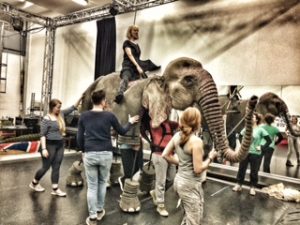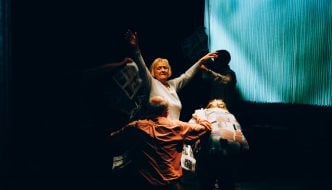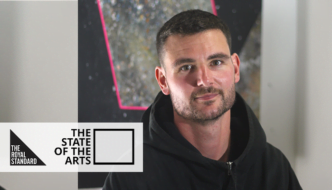
Prior to the tour of Running Wild arriving at West Yorkshire Playhouse, I caught up with one of the cast members: Liz Crowther. (In the theatre community, where everyone knows everyone, it was only a matter of time before I crossed paths with my actress aunt.)
In the role of ‘Grandma’, Liz is something of a parallel heroine: where her grand-daughter, Lilly, has a wild adventure in the Indonesian rainforest, Liz explained how “the grandmother then mirrors her experience in her own quest.” But more than that responsibility, we talked about how the entire ensemble multi-roles: “I’m also a hunter, a bird watcher, a tourist caught up in the tsunami and a tree.” (I believe that all actors have to do their time as a tree!) She added that she even gets a chance to join in with the famous puppeteering: “I was the crocodile’s tail, didn’t you notice me?!”
By describing her multifaceted and demanding role(s), Liz figures as a microcosm for the production as a whole. Diverse elements are layered upon each other, “from the songs, to the exquisite puppetry, to the very strong cast, to the design, to the lighting, and the sound. It’s a fantastically theatrical experience. There’s puppetry and choreography and songs and scenes and then all the sort of technical elements of working out where you come from, where your costume needs to be.” Confessedly “a bit like headless chickens when you first do it”, she assures me that the often frantic layering of theatrical elements only further enhances the sense of excitement.
Asking about the origins of the play, I discovered the current tour of Running Wild presents the show in it’s third incarnation. Originating as a Chichester Youth production, the show also played at Regent’s Park last year. Whilst the show has changed and developed, certain elements remain constant. Changes are immediately obvious in what Liz calls “the extraordinary set”: the Regent’s Park production favoured a natural, rainforest-based set, yet this latest version of the show sees a stage littered with “junk hung all over.” The resulting effect being that “this time they have a reminder of the tsunami all the way through it.” Meanwhile a constant element is figured in the three puppeteers who have been spring-boarded from the first, youth production, into their first professional jobs in the cast. Having been cast members throughout, I trust their opinion when Liz reported “they think this is the best one, because they’ve been refining it all the way through.”
Speaking of alterations, we discussed the play as figured from Michael Morpurgo’s original book. Having given a talk to the cast and crew at Chichester, Morpurgo’s influence is palpable. “He has never liked reading fantasy books”, Liz reports, thus Running Wild stems from a true story. “What caught [Morpugo’s] eye in this was a child who had been rescued in the tsunami by a beach elephant [who] wedged itself between a tree and her hotel so that the child could climb on the roof.” In Morpurgo’s 2009 novel, the story centres around a young boy named Will, yet the heroine of this production is the little girl, Lilly. “They’ve made it into a girl, Lilly, and her grandma, [rather than grandfather] because there seems to be a force in theatre this year that seems to be pushing women and female parts forward”, which we both agreed was much-needed!
This female re-branding isn’t the only politicised message to be taken from this show that initially appears so colourful, playful and perhaps even light-hearted. Covering serious topics such as the 2004 tsunami, the effects of palm oil production on the rainforest, and the trade in young, wild animals, and their skins, the play is scattered with what Liz calls “some hard-hitting messages.” She continues: “It’s about grief, it’s about independence, and discovering things about yourself, your resilience and what you didn’t think you could do. But because it’s in this exciting package […] it would be a great discussion point for kids.” Liz even enthused about one of the child actors who has undertaken her own political action, starting a petition against the use of palm oil in Nutella. Thus the production promises to engage children and adults alike, and even appears to promote a legacy beyond the theatre.
Amongst children in the audience, the cast features three young girls, alternating in the lead role of Lilly. Liz describes them as “very different girls, all fantastic in their own right.” Above their personal talents, Liz says that having children leading the cast “shows you how to act, because they just kind of do it and they’re just so truthful.” Beyond that, Liz assures me that “they’re just such delightful companions.”
The sixteen-strong cast (plus alternates) work together as a big family, having rehearsed together from the beginning. Adults and children, actors and puppeteers all come together, understudy one another and alternate roles to share the load of this demanding and, at times, “hazardous” production. “It’s the most glorious production – it’s so theatrical and it’s got such high production values and such a strong company who all contribute in such an amazing way to support the child heroine.”
A huge element of this community is the puppeteers. Liz told me about the puppetry workshops that the cast lead, alongside the show. I was intrigued about what it must be like to act alongside these life-size animals: “it’s very interesting. I’ve learnt a lot. You need a bit more time sometimes. You just give it a bit more space.”
Conversations around theatrical puppetry nowadays tend to lean towards discussing Morpurgo’s worldwide smash-hit War Horse, so I asked Liz whether the associated legacy was present in the mindset of this production. She assured me that this colourful play was far from hiding in the shadows of its big brother: “I think it’s a sort of expansion of that theatricality. In fact our puppets are more lifelike- so there’s a difference.” Rather than the horse’s skeletal outlines, a la JK Rowling’s “thestrals”, we can expect “filled-in puppets, so they look more realistic.” Backtracking slightly, “having said that, the orangutans don’t have legs! But you don’t notice it” thanks to the intense focus of the puppeteers. “It’s their focus on the puppet that means they then become invisible – they breathe with their puppet and they focus on it together.”
It’s this idea of puppeteers becoming invisible that moved us onto the nature of theatre itself. “What I love about theatre now, and why I was so happy to train at Lecoq school when I did, is exactly that kind of explosion [of theatricality]. People use video, they use sound in different ways, lighting, scenery, tricks with cloth, puppets, miniatures. And actually all the sort of things you don’t really do in film.” By way of a teaser trailer, Liz described the way they present the tsunami in Running Wild: “we do is a stylised version of it and it’s beautiful to watch.” I for one am excited to see how this rainforest-based adventure unfolds on stage.
Judging by the anecdotes of audience reactions, the myriad elements of this production promise to work together to create an undeniably convincing and immersive atmosphere. From children throwing their arms around Liz, shouting “Hello Grandma”, to one young boy asking “What happens when the tiger’s not on stage to stop it eating the other animals?”, this show has truly captured the imagination.
“It’s a very short play, it’s very intense and powerful and captivating for kids, so it does pack a strong punch in every sense: visually and aurally.”
When I quoted W.C. Fields saying ‘never work with children or animals’, Liz laughed and confirmed that she really loves both aspects in this production. “I’m really proud to be part of it.”
Catch Running Wild at West Yorkshire Playhouse from 11th-15th of April, or as part of their nationwide tour.
Filed under: Theatre & Dance
Tagged with: interview, leeds, Liz Crowther, Michael Morpurgo, Running Wild, theatre, West Yorkshire Playhouse



Comments